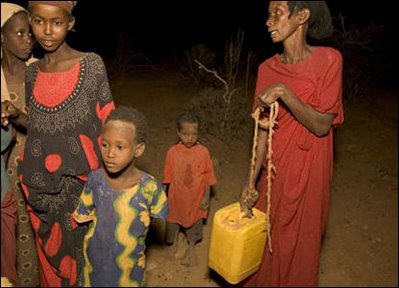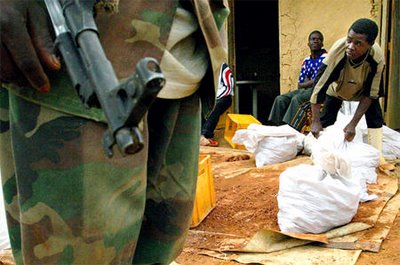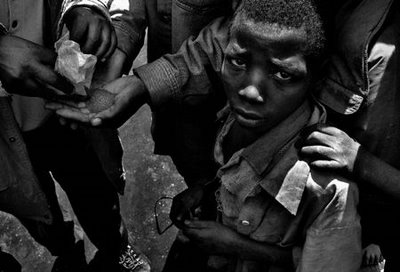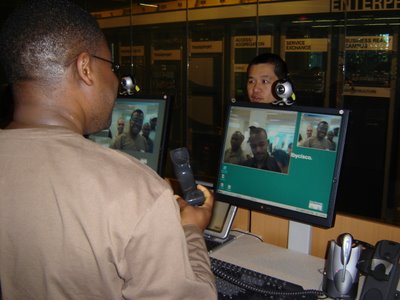Abstract:
"Access" for all is thought to be necessary to tackle social exclusion and promote equality in the "new knowledge economy' by ensuring that the gap beween the "haves" and 'have nots' does not widen as ICT becomes increasingly influencial in relation to educational standards, economic competitiveness and citizenship(1). As Manuel Castel says “Information Technology(IT), together with the ability to use and adapt it, is the critical factor in generating and accessing wealth, power and knowledge in our time. The digital divide in Africa at the dawn of the information age may be the most lasting wound inflicted on this continent by new patterns of dependency”. (2) "The rise of informationalism in this end of millennium is intertwined with rising inequality and social exclusion throughout the world" (Castel 1996, p. 70). Castells traces the phenomenon of exclusion(social or digital divide) across different social and geographic contexts and concludes "the evolution of inter/intra-country inequality varies, what appears to be a global phenomenon is the growth of poverty, and particularly of extreme poverty" (Castel 1997, p. 81).
This project compares enterprise/market conditions in two localities in Uganda in the prism of interventions to bridge the digital divide.The project, comparatively analyses the impact of enterprise development in simple micro enterprises such as the Lawlyn Telecenter,Tororo Uganda and the relatively complex and larger humantarian funded Nakaseke Multi-Purpose Telecenter. The research critically analyses entire project cycles identifying key models or blend of model elements with a visibly high potential of rapid replication level of success in bridging the digital divide in Uganda. The study analyses key elements of success as well as challenges and limitations; structural and policy of both models. It also emphasies the importance of enterprise and market development as the key motivational factor of success in bridging the digital divide through the adoption and intergration of technology in production and supply chains in socially and digitally excluded communities. Finally, the project highlights key circumstances that require affirmative action strategically where markets are limiting. The object often is to stimulate enterprise and market development through adoption and intergration of technology in production and supply chains.
Background: The potential for ICT to transform society is well documented. Universal access to computers and the internet is considered necessary to avoid social divisions and offer opportunities for all by ensuring that future "knowledge economies" include everyone (HM Treasury 2000). The failure in bridging the digital divide threatens to result into powerful digital communication tools exacerbating and entrenching societal disparities. As ICT continues to proliferate, the development of 'digital divides' may require the whole concept of poverty itself to be re-examined. The 'digital divide' will need to be incorporated as one characteristic in a new conception of social exclusion(Damarin 2000; Jackson etal 2000).
The proliferation of ICT in education and expansion of internet-based information and services further amplify the chasm between the information 'haves' and "have-nots'. Those on the wrong side of the divide(s) will have less opportunity to participate and engage with both formal and informal education, training and information( Damarin,2000). Social inclusion and economic development in the 'information age' are mutually reinforcing, and for people in low income communities gaining and exploiting ICT skills leads to opportunities to participate fully in local and national economies(PAT 15 2000). Social exclusion therefore as manifested by the 'Digital Divide' requires a well coordinated multi-stakreholder approach in order to facilitate a process of equitable distribution of opportunities in a globalizing world.
Introduction:
The project was focused on two case studies in Uganda to compare project cycles from conception,execution and sustainability protocols. Uganda is one of the poorest countries located in Sub-Saharan Africa. Relative to the UK, Uganda as a country is digitally under developed. It neighbours Kenya to the East,DR.Congo to the West, Sudan to the North, Tanzania and Rwanda to the South. Seated at the top of the Nile Valley, it faces strategic security challenges that it grapples with to advance. The entire Sub-Sahran region faces immense economic challenges in meeting the social service demands of her people, thus regarded the poorest region in the world.
Lawlyn Telecenter ,Tororo is located 250km East of Kampala the capital of Uganda. Tororo town is approximately 12km from the Uganda Kenya border of Malaba. There has been an influx of donor funded projects on health, agribusiness, education, human rights and also a growing business community due to cross-border trade. Mobilie telecom infrastructure has been built in this township and across the country. There has been an influx of tourists and other cross-border travellers. The town has a large hinterland which is largely rural based with Subsistence agriculture as the major economic activity.
The Nakaseke Multi-Purpose Telecenter on the contrary, is located approximately 50km North of Kampala in a relatively rural community. Despite its closer proximity to the capital,Nakaseke community is mainly subsistentially agro based and infrastructurally inaccessible. Comparatively the community is much poorer than Tororo town which is peri-urban. Nakaseke is actually about 20km off the Kampala-Gulu Road defining the centrality of its inaccessibility in infrastructural terms. What therefore defines the feasibility of government extension of infrastructural services lies in the economic activity of the community and therelies the power of market forces which is a key highlight in the project in BDD in Uganda. Lawlyn Enterprise Telecenter in Tororo township is a small communications shop built purely on an enterprise model offering Internet Services, Email, faxing, scanning, photocopying at costs determined by the market and sound business decisions while Nakaseke Multi-Purpose is much larger more complex in terms of physical presence, equipment and general capital investment. The Nakaseke Multi-Purpose Telecenter, has the hallmark of an affirmative action initiative built on donor funds as a result of the international convention on universal access.
 Discussion: Lawlyn & Nakaseke Multi-Purpose Telecenters in Tororo town and Nakaseke Community are classic examples of public-private efforts in bridging the digital divide. Tororo, like many towns in Uganda, in 2002 did not have a single internet shop but now has a total of 4 internet cafes' taking advantage of the prevailing business opportunities in the communications sectors. The enterprise initiative was visibly built on a prevalent and gradually growing market for internet/Data Communications services. The enterprise development initiative of the Lawlyn Telecenter also is exhibit of the prevalent policy initiatives in government. Uganda today prides in a total of 4 Licensed National Operators since the collapse of the Duopoly agreement between government and MTN/UTL. It also points to the regulatory framework under the Uganda Communications Commission(UCC) under whose jurisdiction these Telecenters operate. The presence of 4 active National Operators in the Country means competition and market penetration in areas that were previously untapped, better services, price wars and better access by the public. UTL, Celtel,Warid Telecom and MTN have rolled out WIMAX technology to reach more rural communities such as Nakaseke, services that were previously the exclusive preserve of the urban elite in the capital.
Discussion: Lawlyn & Nakaseke Multi-Purpose Telecenters in Tororo town and Nakaseke Community are classic examples of public-private efforts in bridging the digital divide. Tororo, like many towns in Uganda, in 2002 did not have a single internet shop but now has a total of 4 internet cafes' taking advantage of the prevailing business opportunities in the communications sectors. The enterprise initiative was visibly built on a prevalent and gradually growing market for internet/Data Communications services. The enterprise development initiative of the Lawlyn Telecenter also is exhibit of the prevalent policy initiatives in government. Uganda today prides in a total of 4 Licensed National Operators since the collapse of the Duopoly agreement between government and MTN/UTL. It also points to the regulatory framework under the Uganda Communications Commission(UCC) under whose jurisdiction these Telecenters operate. The presence of 4 active National Operators in the Country means competition and market penetration in areas that were previously untapped, better services, price wars and better access by the public. UTL, Celtel,Warid Telecom and MTN have rolled out WIMAX technology to reach more rural communities such as Nakaseke, services that were previously the exclusive preserve of the urban elite in the capital.The government policy on building a National Fiber Optics backbone radiating out of the capital Kampala to all remote Local Government Points will bring on board more actors in the market since it stimulates market divelopment as well as enterprise development. There are also challenges such as taxation that can be addressed by policy to encourage enterprenuers invest in this sector to stimulate the economy through improved access to information. There is the energy problem in the Country. While physical access to the national power grid remains a problem in the country side, high power demand has resulted into increased unit costs of utility and thus increased overhead costs for enterprenuers in the internet kiosk business. Governemt is addressing this through promotion of reneweable energy and alternative energy sources such as solar, thermal generation for immediate mitigation during load-sheding hours. This is collective policy action. A hydro electricity dam at Bujagali is under construction,other smaller dams as well as enforcement of energy saving technologies is underway. All these are public policy approaches that are geared towards not just providing free social services but stimulating productivity so that people can harness their environments with the right technology tools. It is a sound reason why Telecenters have sprung up in all townships in Uganda since 2002. All telecom operators have mobile internet services on mobile phones. It is all pointing to policy and market development therefore.
Nakaseke Multi-Purpose Telecenter had the hallmark of affirmative action. Being a rural community with no visible cash economy to talk about. Investment in this project by a private entreprenuer would not be feasible. Considerations such as relevance of internet service to a population that relies entirely on susistance agriculture comes in. How many people actually need access and can afford the service? What is the cost of installation, support and mantenance of the facility? How accessible is the community? What is the level of ICT literacy/general literacy of the community? What public infrastructures are available that can reduce cost of installation? Nakaseke community lacked the ingredients that can stimulate a local enterprenuer to invest in such a project justifying affirmative action from a collaboration with good objectives under the Universal Access Declaration between the government of Uganda through its policy framework and its International Development partners.
The Barriers faced by Nakaseke Community were addresed by:
- Auditing the disadvantages of the community to establish their needs and requirements in terms of content, and promote initiatives that involve them in directly creating materials. This was carried out through a baseline protocol.
- The initiators allowed plans and the entire project to evolve organically from the people they aim to help, but provide support mechanisms to scaffold the development of sustainability. A multi-stakeholder approach helped reduce fragmentation that can create barriers to community participation. An example is the local government requirement that all students in the community contribute to the sustainability of the project.
- Development of better policy and delivery design by identifying clear lines of responsibility for coordination of advice and help through a single communication channel to all those who wish to develop community based initiatives in the community such as the Donors of other projects, district local government and the private sector.
- Identifying and working with recognised information leaders with in Nakaseke Community such as district information managers, local ICT personnels through social mapping to find key individuals, community needs and interests (Benton Foundation 1998).
The Nakaseke Multi-Purpose Telecenter is physically much larger and more complex than the enterprise telecenters across the country due to the investment capital put in by the donors,government and the community. The rapid replication rate of the micro enterprise telecenters is built around their simplicity and innovation of mobilizing refurbished hardware, skills out of business decisions that help sustain the projects. Because donors are not easy to come-by, complex projects of this nature are not easy to implement. In otherwords the difficulty the private entreprenuers finds in investing in undeveloped market niches combined with the scarcity of committed donors complicates the problem of socially excluded communities.
A summary of factors contributing to the digital divide in a Liberal Economy.
Shortcomings of the Markets:
There is an arguement that commercial providers target the most profitable segments of society first and unconnected sections last. There are no guarantees that market provision will deliver affordable ICT to all groups in society. Thus while Lawlyn Telecenter saw an enterprise opportunity in Tororo Township due a growing market, Nakaseke community needed a strategic public intervention to stimulate enterprise and market development.
Market-led provision may reach 'natural' saturation levels and inequalities may be exacerabted following new technical waves and inventions (Booz-Allen & Hamilton 2000). This can be explained from the evolution of the broad band boom and bandwidth intensive applications, the disucssion of Net Neutrality legislation and the threat of internet fragmentation.
Costs:
- The cost of purchasing equipment, telephone costs, tuition and perceptions of costs have been reported as barriers for non-internet users(Motorola 2000). From an enterprenuers perspective, the cost of credit access, interest rates, cost of business, lack of power and overhead costs become apparent. In Tororo this was addressed by the existence of credit service providers , enterprenuers because of feasible market conditions. Because of the remote nature of Nakaseke Community, ineccessibility, lack of or inadequate telecom services, poor business environment and energy problem would hinder a private investor come in leaving public intervention the only option.
- Cheaper calls(26%), unmetered free access(17%) and cheaper subscriptions would encourage greater internet usage among existing home users( OFTEL,2000a). This calls for greater liberalization of the economic sector as well as the telecom sector to bring in more players in the market. Because of their relatively large investment capital chest, they would break into areas where small entreprenuers can penetrate untapped markets like Nakaseke and Tororo. Uganda's policy direction in this direction is impressive but more liberalization of other sectors of the economy has a strong bearing on market stimulation.
Lack of relevance, interest and aspirations
The percieved lack of relevancy has socio-economic dimension. A significant number of people in communities like Nakaseke believe ICT is not relevant to their lives (DTI 1999). They are poor and do not know the relationship between information and economic activity.Many people still largely associate ICTs to the 'economic domain' (Hochschild,Benton Foundation 1998). Individuals in higher socio-economic occupational strata are more likely to use ICT at work (DTI 1999). In 2003, when Lawlyn Telecenter was set up, most NGOs and the local government did not any ICT policy in their operational manual. Lawlyn Telecenter served this cohort of the market as well as travellers, tourists, cross borders and local entreprenuers in search of information. As the telecom sector grew, NGOs started establishing data links in their offices and employees enjoying the internet. More players joined Lawlyn in the business bringing on more competitions, price fluctuations, better services etc. But the issue of relevancy goes further among more remote communities like Nakaseke where the population is largely illiterate and engaged in susistence agriculture.
Poverty aspirations and opportunity are factors that lead to the development of self exclusion and further inequalities. Perceptions of the utility of computers is mediated by individual family discourses, wider learning communities, and particular software environments( Dowes 1998; Tobin).
Lack of Access & Support:
Lack of Literacy:
Lack of Joined-up Approaches:
Barriers to community access:
Conclusion:
'Digital Divide(s)'s have no single, identifiable cause or effect. Many public or private initiatives therefore, are intergrated alongside broader concepts and policies that aspire to tackle deprivation and exclusion. While Lawlyn Enteprise Telecenter took advantage of the general liberalization investment climate in the country, it is possible to note that the Nakaseke Multi-Purpose Telecenter was a public-private response to a general understanding that market forces have limitations. It had the hallmark of the affirmative action initiative geared towards finding a model that helps achieve the ambitious declaration of universal access. Presented below are recommendations and suggestions that propose methods for Bridging the Digital Divide(BDD). Many are in thrusting forward a government framework that addresses policy issues that facilitate enterprise development while also strategically intervening in areas to stimulate market development.
Increasing Access and Support:
Supplementing/enhancing provision from markets:
Reducing Costs:
In summary, ICT development stimulates markets and markets act as incentives for enterprise development. While affirmative action(public intervention) is important in socially excluded communities, it must be geared towards enterprise and market development since there "aint anything like free lunch' at the end of the day. Sustainability of ICT projects in bridging the digital divide can only be possible when direct project beneficiaries have stake in keeping it affloat. The Lawlyn Micro Enterprise Telecenter and it survival in the market despite the replication of its model and stiff competition meant that the market all over the country had developed. Entreprenuers simply saw an opportunity to play their role in responding to the market. These simple telecenters are the face of comunication in all townships in Uganda and their role in bridging the digital divide is enormous. Thus the primary objective of public intervention even in socially excluded communities must strategically be aimed at helping the community build economic capacity and establish more access points to spread the service.
References:
1.http://llk.media.mit.edu/papers/aera2000.pdf
2.http://www.isoc.org/oti/articles/1100/benjamin.html
3.http://felix.openflows.com/html/netparadigm.html
4.http://www.svpww.com/tc_training1.html
5. http://www.idrc.ca/wsis/ev-86365-201-1-DO_Topic.html
6.Benton Foundation 1998 Losing Ground bit by bit: Low-Income Communities in the information age. http://www.benton.org/library/Low-income/
7.Booz-Allen & Hamilton 2000 Achieving Universal Access.Consultation Report for the UK Government on Internet Access. http://www.number-10.gov.uk/default.asp?Pageid=1203
8. Damarin,S 2000. The 'digital divide' versus digital differences: Principlces for equitable use of technology in education. Educational Technology. Vol 40(4).
9.The Rise of the Network Society, The Information Age: Economy, Society and Culture, Vol. I. M. Castells (1996). Cambridge, MA; Oxford, UK: Blackwell, 556 pp., ISBN 1-55786-617-1
10.The Power of Identity, The Information Age: Economy, Society and Culture, Vol. II. M. Castells (1997). Cambridge, MA; Oxford, UK: Blackwell, 461 pp., ISBN 1-55786-874-3
11.The End of the Millennium, The Information Age: Economy, Society and Culture, Vol. III. M. Castells (1997). Cambridge, MA; Oxford, UK: Blackwell, 418 pp., ISBN 1-55786-872-7 5.http://www.gurusoftware.com/GuruNet/Interviews/Internet.htm
12. HM TREASURY 2000 Britain and the knowledge economy. Speech by the Chancellor of the Exchequer to the Smith Institute in London. Feb 16th 2000
13.MOTOROLA 2000. The British and Technology.Slough
14. Policy Action Team 15 (PAT) 2000. Closing the Digital Divide:Information and Communication Technologies in Deprived Areas: London. DTI. http://www.cabinet-office.gov.uk/seu/publications/pat/pat15.doc












































































